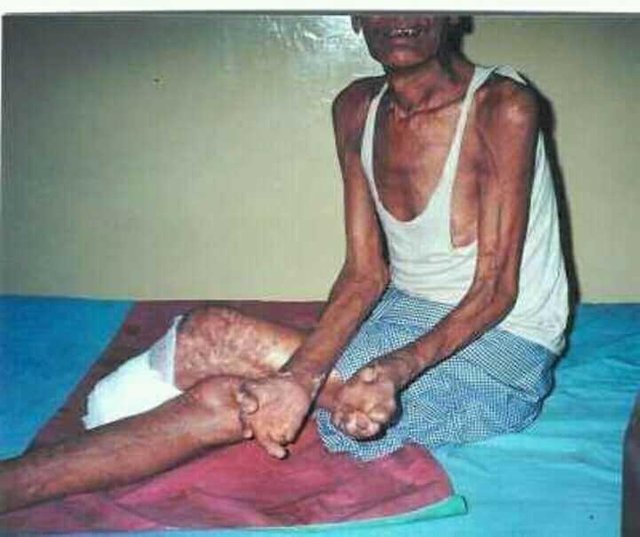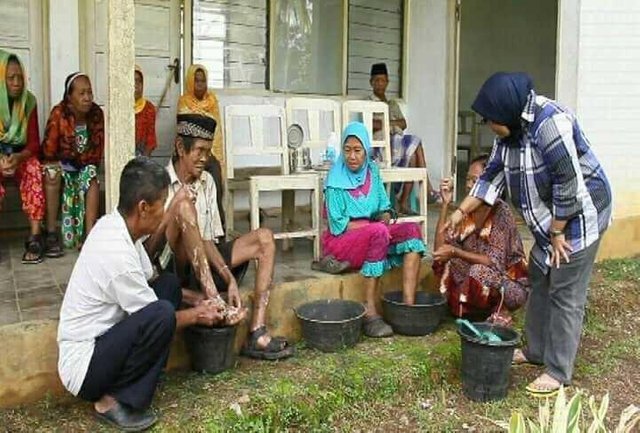Curse Leprosy? Evolution of Bacteria Since 20 Million Years Ago
The ancient mystery behind leprosy, also known as Hansen's disease, has infected humans throughout history finally revealed.
Hundreds of thousands of new cases of leprosy from around the world are found every year, but the disease is rare in the United States, typically ranging from 100 to 200 new asuses each year.
According to scientists from the University of Texas, the genome of leprosy bacteria has evolved and infected ancient humans from 20 million years ago.

Leprosy can be called a curse disease, because for millions of years it continues to infect humans to this day.
Identical leprosy bacteria attack the skin and nerves of patients, antimicrobial treatment is an effective option today.
But when treated, the disease causes skin lesions, facial and limb defects, even many patients die.
The new findings reveal the leprosy hypothesis may stem from the oldest human-specific infection of millions of years ago.
#Evolution Bacterial Leprosy Millions of Years
Xiang-Yang Han, M.D., Ph.D., a professor of medicine, has discovered a new species of leprosy in 2008.
This phenomenon is called Mycobacterium Lepromatosis, where previously known only one type of bacteria (Mycibaterium Leprae) is the main cause of leprosy.
Over the past year, Han and other research teams have found other causes in patients from Mexico, Canada, Brazil, Singapore, end Myanmar.
The team of scientists working with Francisco Silva, a genetic evolutionist from Spain analyzed 20 Mycobacterium Lepromatosis genes.
 
The study has found two leprosy bacteria originating from human ancestors some 10 million years ago.
The bacteria that infect the ancestors have undergone a reductive evolution resulting in 40 percent of the inactive genes in the patient's body.
Their gene then becomes a malfunctioning or even missing Pseudogen.
The evolution of leprosy bacteria appears to be reductive, unique among all commonly known pathogenic bacteria.

According to Han and Silva, leprosy has existed since millions of years ago, this hypothesis connects some previously known facts.
One clear evidence that leprosy is a human disease that develops without the host, when bacteria outside the human body then tiak can develop in artificial media.
One exception, Mycobacterium Leprae is found in the wild Armadilo, but only in North America and South America. According to scientists, this species may have been the first animal infected from the continent's explorers several hundred years ago.
The second evidence is shown in the long history of leprosy seen in the bacterial genome. More than 400 bacteria from around the world analyzed have been found to have the same genome, or clonal basis.
Humans have been carrying leprosy bacteria when Africans migrated around the world about 100,000 years ago.
Leprosy bacteria are considered stable and remarkable for being able to live in their bodies, while the signs of adult parasites are estimated to be much older than 100,000 years.

The third evidence is closely related to the ancestors of both leprosy bacteria that have completed a reductive evolution some 10 million years ago.
So the genome becomes lean and the ability to live freely has disappeared.
This parasite adapts well to a specific host species and may not switch to another host species.
Most amazingly, the oldest age of bacterial leprosy Pseudogenes shows gene inactivation beginning 20 million years ago.
This may be the ancestral point of leprosy bacteria soaring and infecting early humans, the bacteria switch from free living to parasite species.

These bacteria hide by mutating or removing harmful molecules while retaining their host.
In the end will cause the patient's immune damage, this is a common phenomenon in leprosy patients.
Thus, leprosy is regarded as a consequence of the prolonged evolution of bacterial parasitism (Mycobacterium Lepromatosis and Mycibaterium Leprae).
This disease has been plaguing humanity severely. This disease must be eradicated.
Your post was full of useful information but I think you did not use appropriate tags.
Thanks.
Thanks you....what should the tags be appropriate for the current information?sorry
As you see your post was about a disease but your tags were artzone, architecturalphotography etc. which have no connection with this disease. Instead of it you can use your own tags like medical-science, leprosy, disease, health and many other similar tags. I hope you have understood what I was intending to say.
World of Photography
>Visit the website<
Thank you for participating in #architecturalphotography
You have earned 5.05 XP for sharing your photo!
Daily photos: 1/2
Daily comments: 0/5
Multiplier: 1.01
Server time: 04:31:33
Total XP: 12.05/100.00
Total Photos: 1
Total comments: 7
Total contest wins: 0
Follow: @photocontests
Join the Discord channel: click!
Play and win SBD: @fairlotto
Daily Steem Statistics: @dailysteemreport
Learn how to program Steem-Python applications: @steempytutorials
Developed and sponsored by: @juliank
Thanks you
Hello! I find your post valuable for the art community! Thanks for the great post! ARTzone is now following you! ALWAYs follow @artzone and the artzone tag, and support our artists!
Thanks you
Hello! I find your post valuable for the wafrica community! Thanks for the great post! @wafrica is now following you! ALWAYs follow @wafrica and use the wafrica tag!
Thanks you